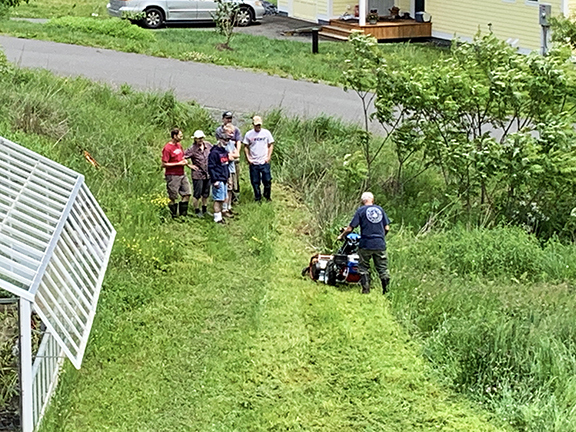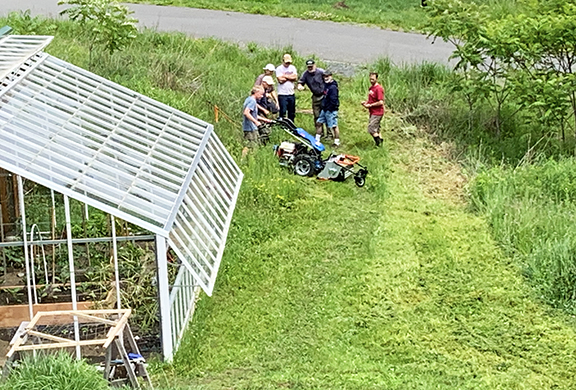
We humans bring our backgrounds and baggage to whatever communities we find ourselves in – whether that’s a workplace, spiritual or activist, or even a book group.
This is especially true in co-housing, as our very intention is to build community by interacting more closely with our neighbors than in a traditional neighborhood.
We join co-housing for a closer, more genuine living experience – and that raises all sorts of issues along with the joys. Working through these issues stretches us as individuals. And to the extent we can act with courage and empathy, builds ties of trust that sustain and strengthen us.
Our community shares certain key tools, some of which we’d be hard put to afford as individuals, such as a tractor and a new, Italian-made walk-behind brushog. This is one of the perks of community living – we share the cost and the upkeep, and get to use these tools to do what needs to be done, whether rototilling our gardens, mowing fields or clearing steep hillsides covered with bittersweet.

The flip side is we need to plan in advance when we want to use a particular tool, as someone else may be using it, or planning to use it just when someone else wanted to – and this is so contrary to our upbringing and habits that problems can arise.
So we learned this summer that our casual sharing methods that had been in place for the past few years were not adequate to avoid conflicts and misunderstandings. Who has the lawnmower? Why wasn’t the tractor in its usual storage spot? The community conversations were getting a bit testy. We needed to talk.
Over the course of a few months, we delved into some underlying issues. For example, the fact that we’d all grown up with, and spent our adulthood (till joining co-housing) with our own family’s tools and with the freedom to use them whenever we liked. We sat with these issues, reflecting on how our conscious and unconscious habits of thinking and interacting had led us here.
As is so often the case, we needed to get to the core issues, care for the hurt feelings, and figure out better methods to avoid future conflict.
Over several months of discussion, we came to a place where we collectively affirmed that our individual relationships were and must always be more important than anyone’s individual convenience or well-meaning desire to adhere to rules. We realized, once again, that first, foremost, and always we need to hold to principles of caring and communication, in this as in all our interactions.
We knew these lessons, yet needed to re-learn them. And we know that we’ll need to keep re-learning them as we figure out how to live in the best way with each other, every day and month and year into our future as a community. While our behaviors don’t always match our ideals, we intend to improve, and we each work to do so in our own ways, to the best of our abilities. This is the essence of intentional community, and why we continue this challenging and rewarding way of living in the world.